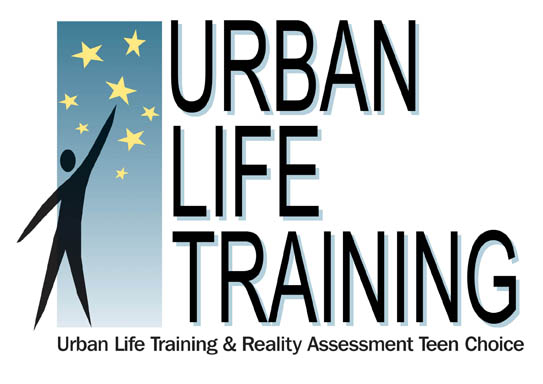- Details
- Category: RIT Training
Urban Life Training provides character-based HIV/AIDS prevention and Relationship Intelligence education. We provide presentations, weekly programs and training seminars on a fee for service basis. Up to a 90 minute presentation for parent groups is free.
Relationship Intelligence Training
Session Summaries
Provided by Urban Life Training
Sessions are approximately one hour long.
Level: (6th grade, or general introduction)
- Part 1 Leadership Training A & B: (this will be presented instead of Part Two and Part Three for 6th grade youth) PowerPoint presentation & activities: Talks about the meaning of being grown up. Emphasizes self control, unselfishness, and the importance of setting goals. Talks about the negative effects of teen drinking, bullying, and uncommitted sex. Explores STD facts and statistics, case studies of young people infected with HIV/AIDS, and introduces the concept of sexual abstinence. Includes refusal skills role-play and 11 ways to succeed in life and love. Plus, I am Abstinence Working Video: Testimonies of College, high school and middle school youth who are committed to abstinence.
Level: 7th to 12th grade
- Part Two Sessions A & B: Protecting Your Future PowerPoint presentation & activities: Focuses on achieving legitimate success and happiness. The decision making process of young people is explored, and participants are asked to write their key life goals. The effects of alcohol and drug use, pornography, injuring oneself and bullying are discussed. Facts about HIV/AIDS, STDs, and sexual activity are discussed. A brief discussion of condom use points out that while consistent use can reduce transmission of some diseases such as AIDS, it does not eliminate risk for infection and does not protect at all from certain diseases. A refusal skills role play is included.
- Part Three Sessions A & B: Maturing Your Love PowerPoint presentation & activities: Explores what defines manhood and what the qualities of lasting love are. Discusses the other risks related to teen sexual activity, such as a much higher incidence of alcohol use and depression. Looks at the emotional damage of teen sex. Presents five star sexuality: mental, emotional, social, moral/spiritual, and physical. Love, family, commitment and marriage are presented as positive, obtainable goals for those who make the right preparation. Media messages regarding sex are discussed. Abstinence and secondary virginity (returning to abstinence) are discussed. Plus, I am Abstinence Working Video: Testimonies of College, high school and middle school youth who are committed to abstinence.
Level: 6th to 10th grade
- Why Wait: Classroom Peer Counseling, STAR Guide Testimonies, and Youth Forum III videos and discussion; Video segments followed by guided small or large group discussion. Topics include: Reasons to stay abstinent, the importance of how you dress, setting boundaries, the benefits of abstinence, the consequences of sex, and the eight D’s of sexual temptation.
- Resisting Peer Pressure Peer Counseling: Video clips of situations where teens are being pressured regarding having sex are viewed, and discussion questions are used to discuss appropriate responses.
When available, youth Peer Counselors lead this session. - Learning Assertive Techniques Peer Counseling: Youth learn how to avoid situations where there might be pressure to engage in sex or drug or alcohol use. Youth learn how to say no using verbal and nonverbal methods, and they practice using these skills. Participating youth practice using assertive techniques. When available, youth Peer Counselors lead this session.
Participants are invited to sign the ULTRA Teen Choice pledge of abstinence.
Level: 9th grade to 12th grade
- Part Four: Sessions A & B Relationship Intelligence PowerPoint presentation & activities: Topics Include: Relationship deposits and withdrawals, Relationship myths, Dating violence, the Chemistry of infatuation, Sexual conditioning, the Importance of marriage, Parental love, Stages of love, the Five love languages, The effects of pornography, Cohabitation, and the Predictors of marital success.
- Part Five Sessions A & B: Self leadership: Managing Emotions and Relationships PowerPoint presentation & activities: Topics include: Five priceless gifts: health, mind, heart, conscience, will power, and sexuality; forgiveness, core values, anger discussion and strategies, confrontation style, domestic violence success story, analysis of the marketing of sex, alcohol, and violence, damaging effects of pornography, and developing your character for a successful marriage.
Level: 11th and 12th grade
- Why Wait Peer Counseling: Adult/youth panel discusses the importance of waiting. Includes; DC (or other local) Reality Check on teen pregnancy and STDs, abstinence testimonies, reasons to choose abstinence activity, things that will help me to stay abstinent, question and answer time. Some topics covered by prepare questions that the panel answers are: setting boundaries, is kissing OK, and does having sex make you feel loved? Participants are invited to sign the ULTRA Teen Choice pledge of abstinence.
Download the Character Based Sexual Health Education Flier:Here
- Details
- Category: RIT Training
Federal Guidelines for Abstinence Education Programs
(Title V and Community Based Abstinence Education)
A. Has as its exclusive purpose, teaching the social, psychological and health gains to be realized by abstaining from sexual activity.
B. Teaches abstinence from sexual activity outside marriage as the expected standard for all school-age children.
C. Teaches that abstinence from sexual activity is the only certain way to avoid out-of-wedlock pregnancy, sexually transmitted diseases and other associated health problems.
D. Teaches that a mutually faithful monogamous relationship in the context of marriage is the expected standard of human sexual activity.
E. Teaches that sexual activity outside of the context, of marriage is likely to have harmful psychological and physical effects.
F. Teaches that bearing children out-of-wedlock is likely to have harmful consequences for the child, the child's parents and society.
G. Teaches young people how to reject sexual advances, and how alcohol and drug use increase vulnerability to sexual advances.
H. Teaches the importance of attaining self-sufficiency before engaging in sexual activity.


